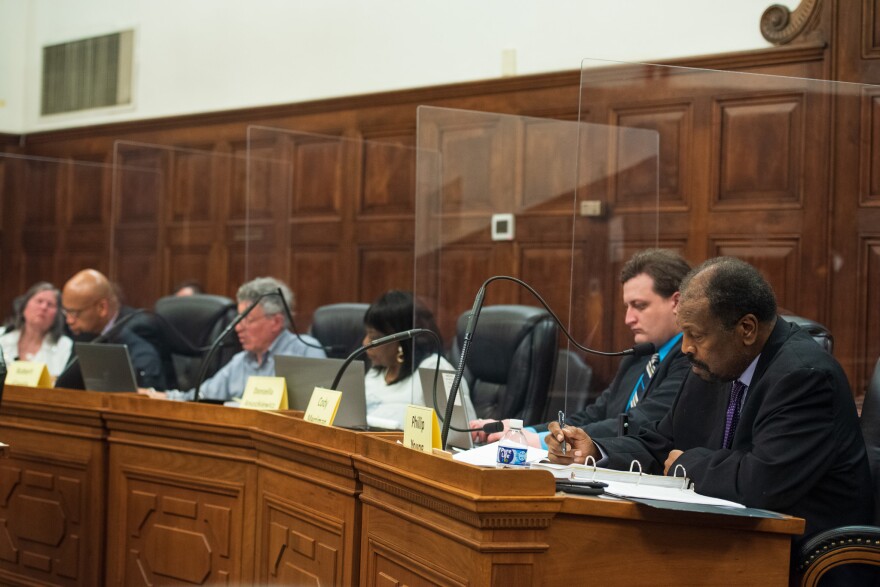Akron's Citizens' Police Oversight Board is considering a compromise on an issue that's split the board for months.
The debate centers on whether the board has the power to conduct investigations into the Akron police at the same time the department is conducting its own internal investigation. The board unanimously approved its rules, including this power, in July but has yet to agree to send them to city council for approval. The vote came after representatives from Akron's police union said they don't think the board should conduct its own investigations into citizen complaints.
Brandyn Costa proposed the amendment to the resolution during the board's meeting on Wednesday, essentially agreeing to wait for a new collective bargaining agreement with the city's police union before acting on the power to conduct parallel investigations.
"It also takes the position and declares the board will forgo launching any investigations until the city of Akron has finalized its negotiations with the Fraternal Order of Police," Costa explained.
It also would give the board time to staff up, he said.
"It also takes into consideration the practical reality at this point our board is not at it's full capacity in order to undertake an investigation perhaps to the degree in which we believe should be done so," Costa said.
But some members, like Vice Chair Donzella Anuszkiewicz, contend that the city's law department warned the board that this power could lead to a legal battle between the city and FOP, as it breaks the current collective bargaining agreement between the union and the city.
"It's better for us to try to get along with everyone rahter than always fighting each other," Anuszkiewicz said. "We're always going to be fighting with the FOP if we keep advocating for parallel investigations."
Proponents of the amendment said it would be a compromise between the board and the FOP and avoid any legal battles.
"Really avoid litigation that can be both costly and detrimental to the mission of this board which is ultimately to improve policing relationships between the citizens of Akron and the Akron Police Department," Costa said.
Anuszkiewicz disagreed.
"I honestly don't see them agreeing to something like that," she said.
Bob Gippin contended it's not impossible for the FOP to get on board with the amendment.
"For what it's worth, I mean it's been agreed to in other cities," he said. "There's been a tradeoff."
The proposal wouldn't just act as a compromise between the board and the FOP, it would also be a compromise between these two dueling opinions on the board itself, Gippin said.
"Given that there is a difference, this is a way of bridging the difference, a compromise," he said, "and that's why I think it's a wise thing."
Not only did Anuszkiewicz say she was concerned about what the FOP thinks, she disagreed that the board should conduct parallel investigations at all.
"It's not impossible. I just don't know if it's best practice," Anuszkiewicz said. "Having been a federal investigator myself, there's no way I would have been investigating the same case at the same time the state was still investigating it."
Anuszkiewicz asked what the benefits of having the power to conduct parallel investigations would be. It likely wouldn't happen often, Gippin said.
"It would be the very rare case, the very rare case, in which we would have the resources, at least as we're presently structured with a staff of three, very rare case that we would ever do it," Gippin said.
In those cases, Gippin contended having the power would be beneficial to the board. If the board can finish its investigation before disciplinary actions are taken, its recommendations can be taken into account in real time, he said.
"Then it has the potential to actually impact the decision," he said.
As the charter states, the board does not have the power to make changes or take disciplinary actions. Instead, the board can make recommendations to elected officials and police leaders based on its research and investigations.
Both Anuszkiewicz and Tristan Reed agreed there are better things the board could fight for instead of this.
"I think there are other things that we could put our energies to that might actually bare fruit," Anuszkiewicz said.
Reed suggested fighting for a say in FOP negotiations instead.
"Quite frankly, I feel that if we are looking to sit at the table when the FOP are conducting their negotiations, I think that is what we should put in our resolution," she said.
The board tabled the discussion, so all members could be present to vote. Chair Kemp Boyd was absent for the meeting.
"This is something that we all ought to be present for and to act on," Gippin said.
He proposed the board take it up for more discussion and to vote during its retreat on Saturday.





